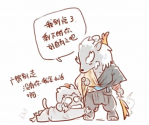It's a funny analogy but points to a real question as to the significance of this game. I haven't played it yet myself, and it could well be that my reading around the game has led me astray, but my impression is that Black Myth: Wukong is more significant in illuminating a path that China's games industry has previously left untravelled, rather than being a genuinely transcendent work of art in its own right. The vibe I get is that the game is in many respects very impressive, but also limited in scope, reflecting very real constraints. To be clear, that is by no means a criticism, most of my favourite games could be described in similar terms, but it speaks to the applicability of the "J-20" analogy. To put it another way, Black Myth: Wukong is significant not so much on its own terms as for demonstrating that Chinese developers can, given the budget and opportunity, create AAA-class single-player experiences, with the traditional "boxed product" monetisation to match, steeped in Chinese culture, and find critical and commercial success both within and beyond the Chinese market. Those are lessons that Game Science and other Chinese developers and publishers can use to guide their future projects.
I'm not sure that the world of video games was ever truly narrow and homogenous enough for one transformational title to shift the needle beyond the confines of its own genre in the manner that the J-20 analogy would seem to suggest. Even thinking back to the seminal titles of the mid-late 1990s where my own experiences and reliable memories begin, I think one would struggle to make the case for the influence of Half-Life beyond the FPS genre, or StarCraft beyond the RTS genre. But if those days ever did exist, I think they are long gone. At most you get more narrow technical, stylistic or design influences, such as the innumerable games that have taken Breath of the Wild as an aesthetic template.
The parallel that leaps out at me for Black Myth: Wukong and Game Science is with CD Projekt Red: games with high ambitions in technical, narrative and design terms that often fell short in the execution at launch, but were then subject to unusually extensive post-release support that progressively beat these rough gems into shape and earned the undying loyalty of their fans. As a certified woke leftist, I try to avoid most of the tiresome culture war nonsense that many here seem to revel in, but there are some interesting parallels in that regard too. The original Witcher game had a mechanic whereby sleeping with the game's female characters would award the player a card with artwork depicting them in a state of undress, creating (in the eyes of some critics) a "gotta catch 'em all!" mechanic that objectified the female characters in question. CDPR insisted that their intentions had been misunderstood, but what was unfortunate about that controversy is that is that overshadowed the game's otherwise commendable depiction of its female characters with diverse and interesting personalities, backstories, motivations, etc. Of course, in Witcher 2 the cards and their artwork were gone but the robust characterisation remained.
I suppose the question is what is a "genuinely transcendent work of art in its own right".
For the type of game that it is -- a primarily action RPG, that is by design not open world but still with extensive secret items/miniquests/boss fights, and side paths, I consider this game to be among the best. If you combine that with respect for the lore and culture that is depicted in an original way, with also some excellent characterization and cutscenes (beyond say, the likes that Fromsoft usually has), all wrapped up in a technically impressive package with excellent art direction, boss design, and combat mechanics, I think for the type of game that it is it really is a work of art that stands up with the best among the genre it lies in.
For example, if we are talking about action RPGs, many people are moving towards a more "souls-flavoured" design these days, but that doesn't mean Demons Souls (or Kings Field before it) meant that the successors (Dark Souls 1, 2, 3, Bloodborne, Sekiro, Elden Ring) didn't have "genuinely transcendent works of art" among them either or that other action RPGs which takes souls-esque elements like God of War 2018/Ragnarok and Jedi Fallen Order/Survivor didn't take significant elements from them as well or that they were not also works of art with their own strengths.
If you are talking industry changing games like Counter Strike for FPS or the original Starcraft for RTS (or more recently, Genshin Impact as a Gacha game with AAA quality), I certainly agree that Black Myth isn't that -- but at the same time I don't think there have been many games like that in modern history.
If we are comparing it to J-20, I suppose it also depends on what we view J-20 as.
IMO J-20 was proof that the Chinese aerospace industry could produce a highly competitive product that was in many of the important aspects at minimal equal to the best of what could be produced elsewhere, and set a foundational benchmark for future expectations of new products and development, while also having both industry success and success in providing immense military capabilities to its specified customers.
For Black Myth, I see it as proof that the Chinese videogame development industry are able to produce a highly competitive product that is broadly excellent and competitive at minimum in many important domains of its genre, and it sets a foundational benchmark for what future products of this category are expected to match or exceed, while also being critically and commercially successful domestically and abroad.
As someone whose preferred videogame genre are action RPGs of the Souls or Souls-adjacent variety (I've played Dark Souls, Dark Souls III, Bloodborne, Sekiro, God of War 2018, Jedi Fallen Order, Elden Ring, a bit of Stellar Blade), while also having exposure to some other varieties over the years (Last of Us, Horizon, Starcraft II, Diablo III, Genshin Impact, Persona 5, Armoured Core 6, Ratchet and Clank), I very much consider Black Myth to be in the action RPG/Souls-adjacent category and it was always advertised as such.
As an action RPG, the most important features I personally value are: combat mechanics, enemy design and variety, boss design and variety, level design.
Other features that help an action RPG stand out include: art direction, graphics, lore/world building, characterization, voice acting.
For the "important features of an action RPG", I consider all of them to be "excellent or spectacular" for Black Myth, except for level design which I would rate as "competent to good" (which isn't bad per se -- for example I would say level design in Black Myth is no inferior to Demons Souls, or Sekiro in terms of linearity, maybe a bit better for some levels in terms of open-worldness, and worse in terms of invisible walls/boundary setting)
For the "other features" that help an action RPG stand out, I consider all of the factors to be "excellent or spectacular" except for possibly graphics which is dependent on your own setup (and even then at minimum I'd rate it as "excellent").
Last edited:




